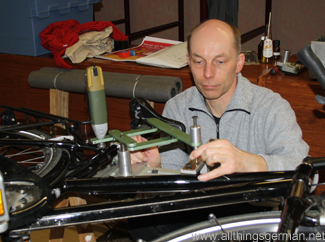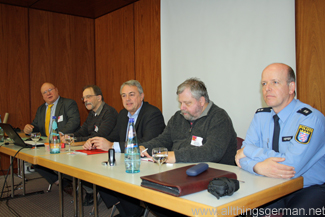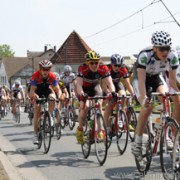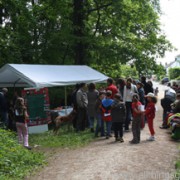Oberursel is a very bicycle-friendly town. We have new cycle paths running along the Hohemarkstraße (albeit with some traffic lights that often get ignored), a major cycle race passes through the town each year, you can hire bikes at the new Taunus Information Centre, and there were even special signs and stands for cyclists at the Hessentag last year.

Andreas Ripken (ADFC) engraving a cycle frame
And then there is the Tag des Fahrrads – the day of the bicycle, which was held last weekend on Sunday at the Stadthalle. More than 1,000 people turned up to find out more about using GPS navigation, places to visit in the summer, e-bikes (pedelecs), or simply just to find out what models the local dealers have on offer.
One of the highlights of the afternoon was a discussion on how children get to school – and in particular the practicalities of cycling to school in Oberursel.

Walter Breinl, Jan Prediger, Arnold Richter, Tilman Kluge and Bernd Meffert debate cycling to school
Taking part in the discussion were Arnold Richter from the town’s planning office, Tilman Kluge of the local area administration (Hochtaunuskreis), Jan Prediger from the ADFC, Walter Breinl – headmaster of the school (IGS) in Stierstadt and Bernd Meffert – a policeman who visits schools to train children how to ride properly.
Each of them in turn presented their view of the current situation, how they are involved and also what they are responsible for.
For example, whilst the town of Oberursel has put €100,000 aside for the upkeep of the cycle paths this year, it is the local administration (Kreis) that is responsible for the bicycle stands at the schools.
Herr Breinl in particular made an impressive plea for more children to cycle to school, and showed that his knowledge as headmaster of a local school goes further than just statistics. He explained that children who walk or ride to school in his experience actually study better than those who come by bus or car. He also went into some detail about the cycle paths in the area, which in one case actually meant that children either had to negotiate some tough obstacles on their route or effectively break the law by riding where they shouldn’t.
It was also interesting to discover that all children in the local schools are taught how to ride on the road in their 4th year by the police. No doubt I shall be writing more about that next year!
One of the most important messages that came out of the afternoon was that parents need to be a role model for their children. If the parents don’t use their bicycles, how do they expect their children to learn properly?
But in general Oberursel was praised for their local cycle network and how much development it has received.
As for those problematic cycle paths: the town would like to hear about them so that they can take the necessary action.




Speak Your Mind